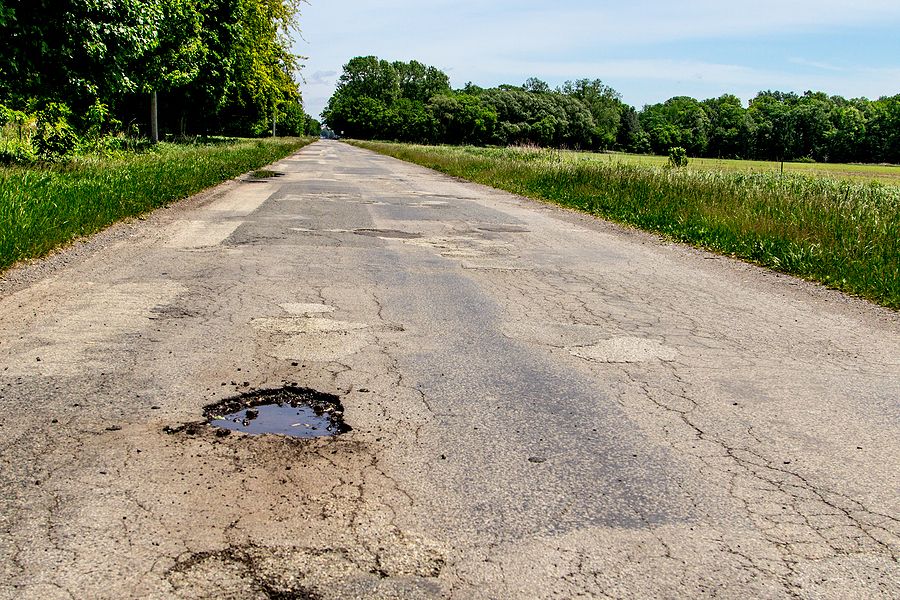How Road Hazards Affect Motorcyclists: What to Look For

More than 24,000 motorcycle accidents every year are caused by "noncollision" events, rather than accidents involving another vehicle or a fixed object such as a light pole or tree. Many of these non-collision accidents can be traced back to hazards present on the road at that time.
From unsafe road conditions to animals in the roadway, these hazards should be taken seriously by motorcyclists at all times. Through awareness of potential dangers and vigilance to spot these hazards up ahead, you can practice the defensive driving necessary to minimize your risk of a bike accident.
Common Motorcycling Road Hazards
Not all road hazards are a danger to motorcycles and other vehicles equally. Although certain road conditions may only be a minor concern to the average driver of a car or other vehicle, a (motorcyclist) could be at significant risk for overlooking or underestimating certain road conditions that could cause them to lose control.
Road hazards posing a specific threat to motorcycles include the following:
- Gravel on roadways. While gravel is rarely a significant concern for cars, trucks, and other vehicles, these rock granules affect the grip and handling of your motorcycle on a paved road.
- Rain or other slick conditions. While slippery conditions are a danger to any vehicle, they can be particularly hazardous to motorcycles, which may face a higher risk of sliding out and losing control.
- Road debris. Blown tires, fallen branches, and other debris could cause damage to a motorcycle and/or cause the driver to lose control.
- Poorly maintained roads. Potholes, cracks, and gaps could all knock a tire off course and cause the driver to lose control.
- Flawed road design. Hairpin turns and absent shoulders—especially when not marked by signage—could create a slim margin for error that raises the risk of an accident.
- Crossing animals and pedestrians. Moving obstacles on the road could seriously damage a motorcycle and/or its driver. Or, if the moving object is avoided, the motorcycle may end up running off the road and wrecking.
- Parked vehicles. In cases where a vehicle is illegally parked on a roadway, motorcyclists could be at risk of crashing.
Winter Driving Road Hazards for Motorcyclists
If you choose to take your motorcycle out in the winter, additional road hazards may be waiting for you—and these dangers should be fully understood and prepared for before you leave your home.
Unlike other times of the year, winter drivers may face the following dangers:
- Snowy and icy roads. The slippery, wet conditions faced in the summer only get worse when temperatures drop below freezing. Icy roads—including hard-to-see black ice—can be particularly dangerous to motorcyclists.
- Salted roads. Even when salt succeeds in getting rid of ice on the road, the granules create a loose driving surface similar to gravel. This could cause the wheels of a motorcycle to lose traction on the road.
- Severe wind and cold. Even if your motorcycle is saved from frigid temperatures, drivers could quickly develop frostbite, hypothermia, and other issues if they aren't properly dressed and protected from the cold.
Tips for Better Road Hazard Protection
Road hazards are inevitable for motorcyclists or any other driver. But the right protective measures can help you avoid these hazards and protect both yourself and your bike from damage.
Here are some simple ways to better protect yourself from dangers encountered on the road:
- Respect the speed limit of any road you're driving on. Posted speed limits are meant to ensure roadway safety. By avoiding the impulse to drive faster, you will have more time to react to roadway hazards.
- Give the vehicles in front of you more space when driving. By refusing to tailgate vehicles, you'll have a better view of the road ahead and more time to react based on the actions of other vehicles.
- Wear a properly fitted helmet at all times. Motorcycle helmets are required by Georgia law, and they could save your life in the event of an accident.
- Make sure your tires are in good health and properly inflated. As the only part of your motorcycle that makes contact with the road, it's wise to check your tires regularly to make sure they have adequate tread and are inflated to the recommended pressurization.
- Always practice defensive driving. As a motorcyclist, you are both more difficult for other vehicles to see, and at greater risk of injury if an accident occurs.
What if a Road Hazard Causes an Accident?
If you do have the misfortune of striking a road hazard or suffering an accident due to dangerous conditions, your first priority should be to seek out medical attention and make sure your emergency health needs are met.
Your next step should be to contact a local motorcycle accident attorney to receive a free consultation about your accident and your potential legal options. It may be possible to seek out compensation from a party liable for the hazards you faced on the roadway, which may prove invaluable in helping you recover—both financially and otherwise—after your bike accident.
Looking for an attorney to discuss a recent motorcycle accident? Contact a local law office today.
